Company Law Assignment: Contractual Validity and Powers of Directors
VerifiedAdded on 2023/01/10
|5
|951
|93
Homework Assignment
AI Summary
This company law assignment addresses the validity of contracts and the powers of directors within the context of Australian corporate law. The assignment examines two primary legal issues: the enforceability of contracts made by a company (Events R Us Ltd) with Ultimate Computer Programs and the City of Sydney, and the legal implications when a company acts beyond its constitutional provisions. It also covers the power of directors and their relationship with the company as defined by its constitution. The solution applies relevant sections of the Corporations Act, including sections 124, 125, 126, and 134, alongside contract law principles such as offer and acceptance, capacity, and consideration, to determine the validity of the contracts. The analysis concludes that the contracts are enforceable, and the directors acted within their powers based on the company's constitution and replaceable rules.
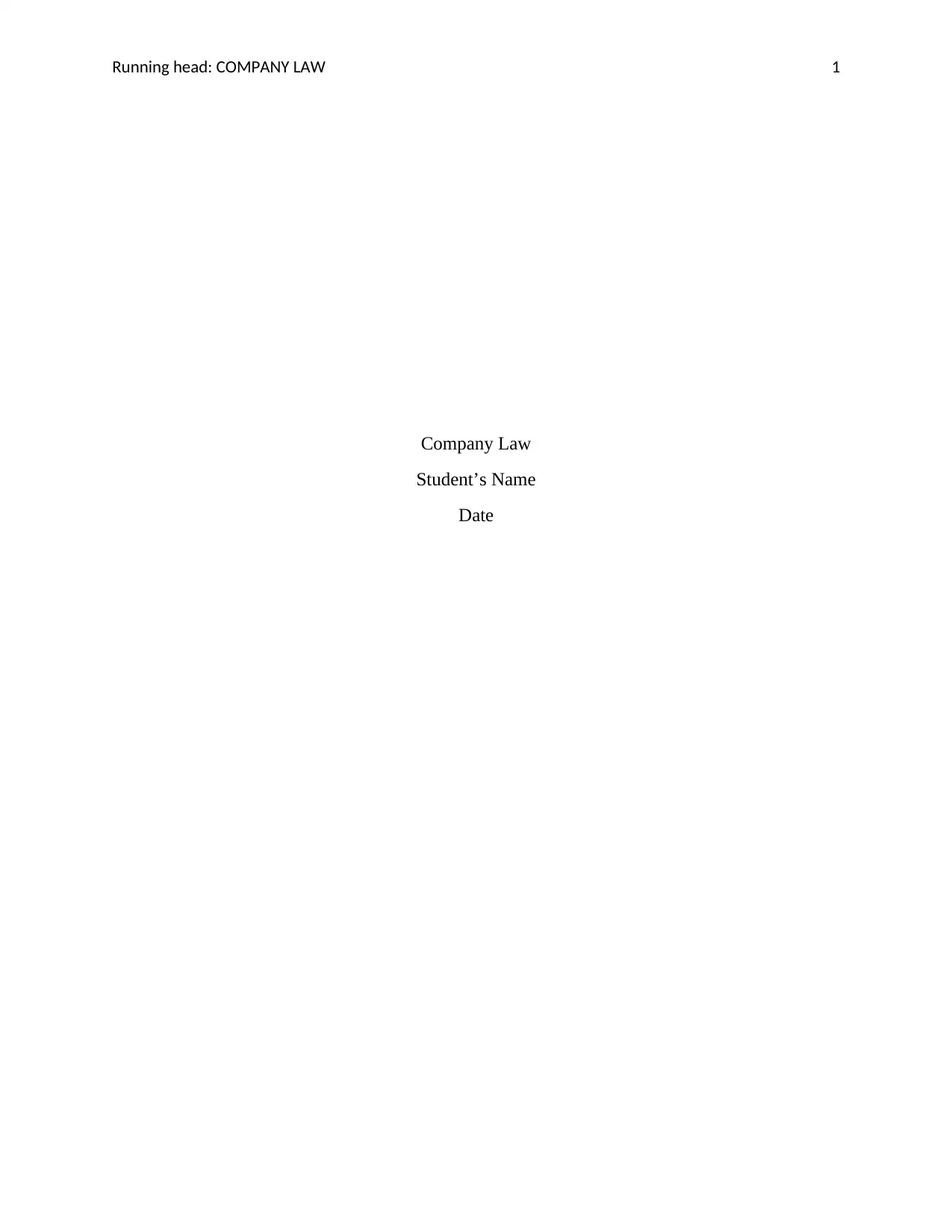
Running head: COMPANY LAW 1
Company Law
Student’s Name
Date
Company Law
Student’s Name
Date
Paraphrase This Document
Need a fresh take? Get an instant paraphrase of this document with our AI Paraphraser
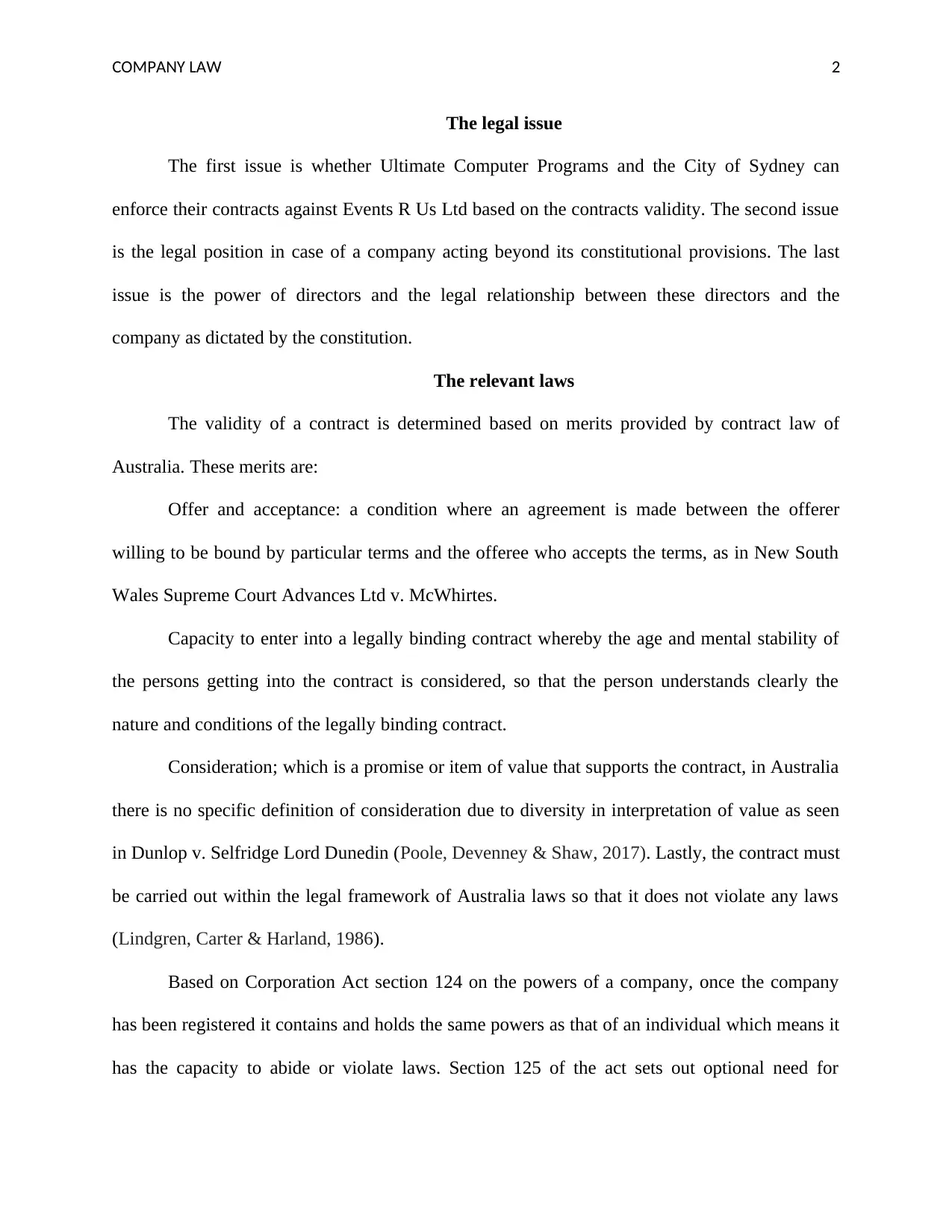
COMPANY LAW 2
The legal issue
The first issue is whether Ultimate Computer Programs and the City of Sydney can
enforce their contracts against Events R Us Ltd based on the contracts validity. The second issue
is the legal position in case of a company acting beyond its constitutional provisions. The last
issue is the power of directors and the legal relationship between these directors and the
company as dictated by the constitution.
The relevant laws
The validity of a contract is determined based on merits provided by contract law of
Australia. These merits are:
Offer and acceptance: a condition where an agreement is made between the offerer
willing to be bound by particular terms and the offeree who accepts the terms, as in New South
Wales Supreme Court Advances Ltd v. McWhirtes.
Capacity to enter into a legally binding contract whereby the age and mental stability of
the persons getting into the contract is considered, so that the person understands clearly the
nature and conditions of the legally binding contract.
Consideration; which is a promise or item of value that supports the contract, in Australia
there is no specific definition of consideration due to diversity in interpretation of value as seen
in Dunlop v. Selfridge Lord Dunedin (Poole, Devenney & Shaw, 2017). Lastly, the contract must
be carried out within the legal framework of Australia laws so that it does not violate any laws
(Lindgren, Carter & Harland, 1986).
Based on Corporation Act section 124 on the powers of a company, once the company
has been registered it contains and holds the same powers as that of an individual which means it
has the capacity to abide or violate laws. Section 125 of the act sets out optional need for
The legal issue
The first issue is whether Ultimate Computer Programs and the City of Sydney can
enforce their contracts against Events R Us Ltd based on the contracts validity. The second issue
is the legal position in case of a company acting beyond its constitutional provisions. The last
issue is the power of directors and the legal relationship between these directors and the
company as dictated by the constitution.
The relevant laws
The validity of a contract is determined based on merits provided by contract law of
Australia. These merits are:
Offer and acceptance: a condition where an agreement is made between the offerer
willing to be bound by particular terms and the offeree who accepts the terms, as in New South
Wales Supreme Court Advances Ltd v. McWhirtes.
Capacity to enter into a legally binding contract whereby the age and mental stability of
the persons getting into the contract is considered, so that the person understands clearly the
nature and conditions of the legally binding contract.
Consideration; which is a promise or item of value that supports the contract, in Australia
there is no specific definition of consideration due to diversity in interpretation of value as seen
in Dunlop v. Selfridge Lord Dunedin (Poole, Devenney & Shaw, 2017). Lastly, the contract must
be carried out within the legal framework of Australia laws so that it does not violate any laws
(Lindgren, Carter & Harland, 1986).
Based on Corporation Act section 124 on the powers of a company, once the company
has been registered it contains and holds the same powers as that of an individual which means it
has the capacity to abide or violate laws. Section 125 of the act sets out optional need for
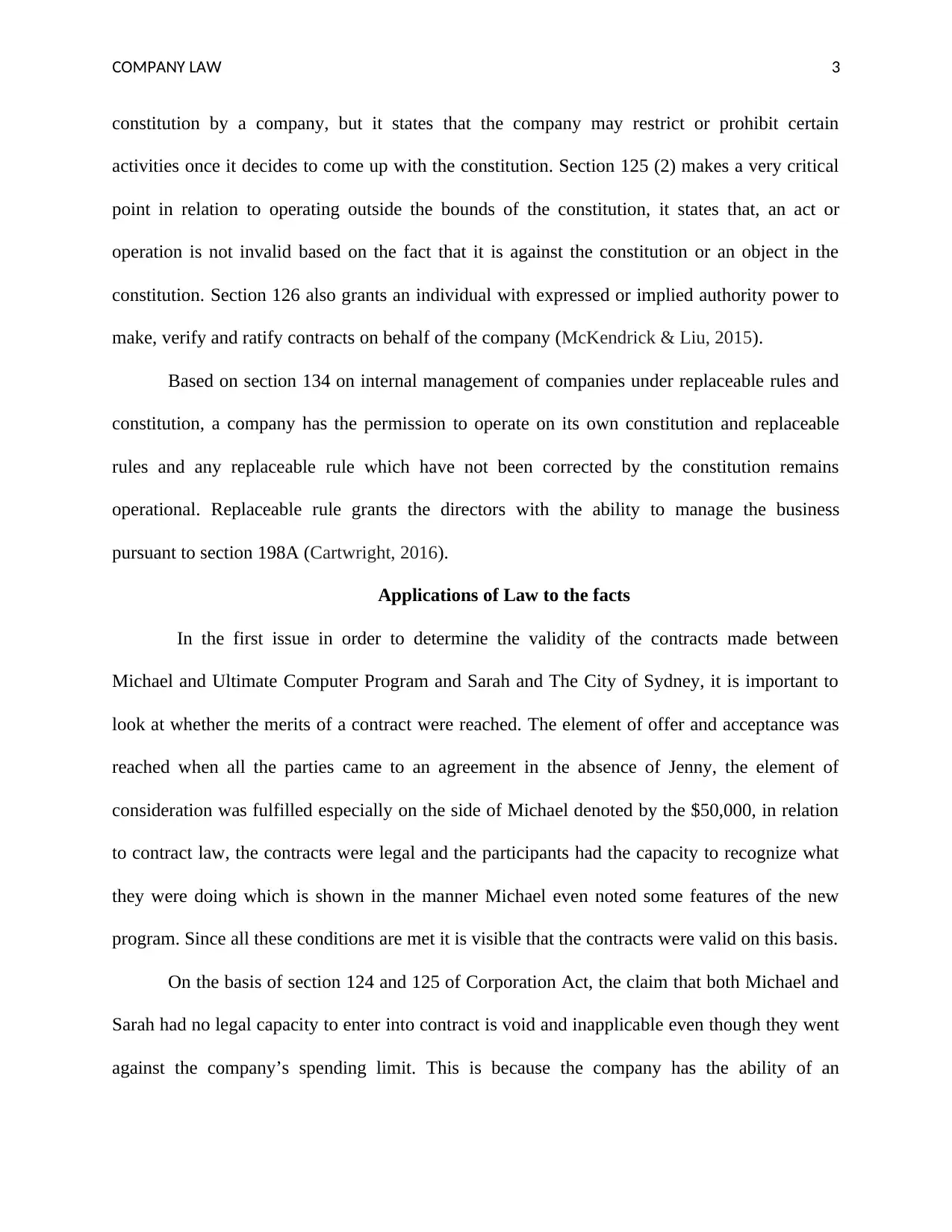
COMPANY LAW 3
constitution by a company, but it states that the company may restrict or prohibit certain
activities once it decides to come up with the constitution. Section 125 (2) makes a very critical
point in relation to operating outside the bounds of the constitution, it states that, an act or
operation is not invalid based on the fact that it is against the constitution or an object in the
constitution. Section 126 also grants an individual with expressed or implied authority power to
make, verify and ratify contracts on behalf of the company (McKendrick & Liu, 2015).
Based on section 134 on internal management of companies under replaceable rules and
constitution, a company has the permission to operate on its own constitution and replaceable
rules and any replaceable rule which have not been corrected by the constitution remains
operational. Replaceable rule grants the directors with the ability to manage the business
pursuant to section 198A (Cartwright, 2016).
Applications of Law to the facts
In the first issue in order to determine the validity of the contracts made between
Michael and Ultimate Computer Program and Sarah and The City of Sydney, it is important to
look at whether the merits of a contract were reached. The element of offer and acceptance was
reached when all the parties came to an agreement in the absence of Jenny, the element of
consideration was fulfilled especially on the side of Michael denoted by the $50,000, in relation
to contract law, the contracts were legal and the participants had the capacity to recognize what
they were doing which is shown in the manner Michael even noted some features of the new
program. Since all these conditions are met it is visible that the contracts were valid on this basis.
On the basis of section 124 and 125 of Corporation Act, the claim that both Michael and
Sarah had no legal capacity to enter into contract is void and inapplicable even though they went
against the company’s spending limit. This is because the company has the ability of an
constitution by a company, but it states that the company may restrict or prohibit certain
activities once it decides to come up with the constitution. Section 125 (2) makes a very critical
point in relation to operating outside the bounds of the constitution, it states that, an act or
operation is not invalid based on the fact that it is against the constitution or an object in the
constitution. Section 126 also grants an individual with expressed or implied authority power to
make, verify and ratify contracts on behalf of the company (McKendrick & Liu, 2015).
Based on section 134 on internal management of companies under replaceable rules and
constitution, a company has the permission to operate on its own constitution and replaceable
rules and any replaceable rule which have not been corrected by the constitution remains
operational. Replaceable rule grants the directors with the ability to manage the business
pursuant to section 198A (Cartwright, 2016).
Applications of Law to the facts
In the first issue in order to determine the validity of the contracts made between
Michael and Ultimate Computer Program and Sarah and The City of Sydney, it is important to
look at whether the merits of a contract were reached. The element of offer and acceptance was
reached when all the parties came to an agreement in the absence of Jenny, the element of
consideration was fulfilled especially on the side of Michael denoted by the $50,000, in relation
to contract law, the contracts were legal and the participants had the capacity to recognize what
they were doing which is shown in the manner Michael even noted some features of the new
program. Since all these conditions are met it is visible that the contracts were valid on this basis.
On the basis of section 124 and 125 of Corporation Act, the claim that both Michael and
Sarah had no legal capacity to enter into contract is void and inapplicable even though they went
against the company’s spending limit. This is because the company has the ability of an
⊘ This is a preview!⊘
Do you want full access?
Subscribe today to unlock all pages.

Trusted by 1+ million students worldwide
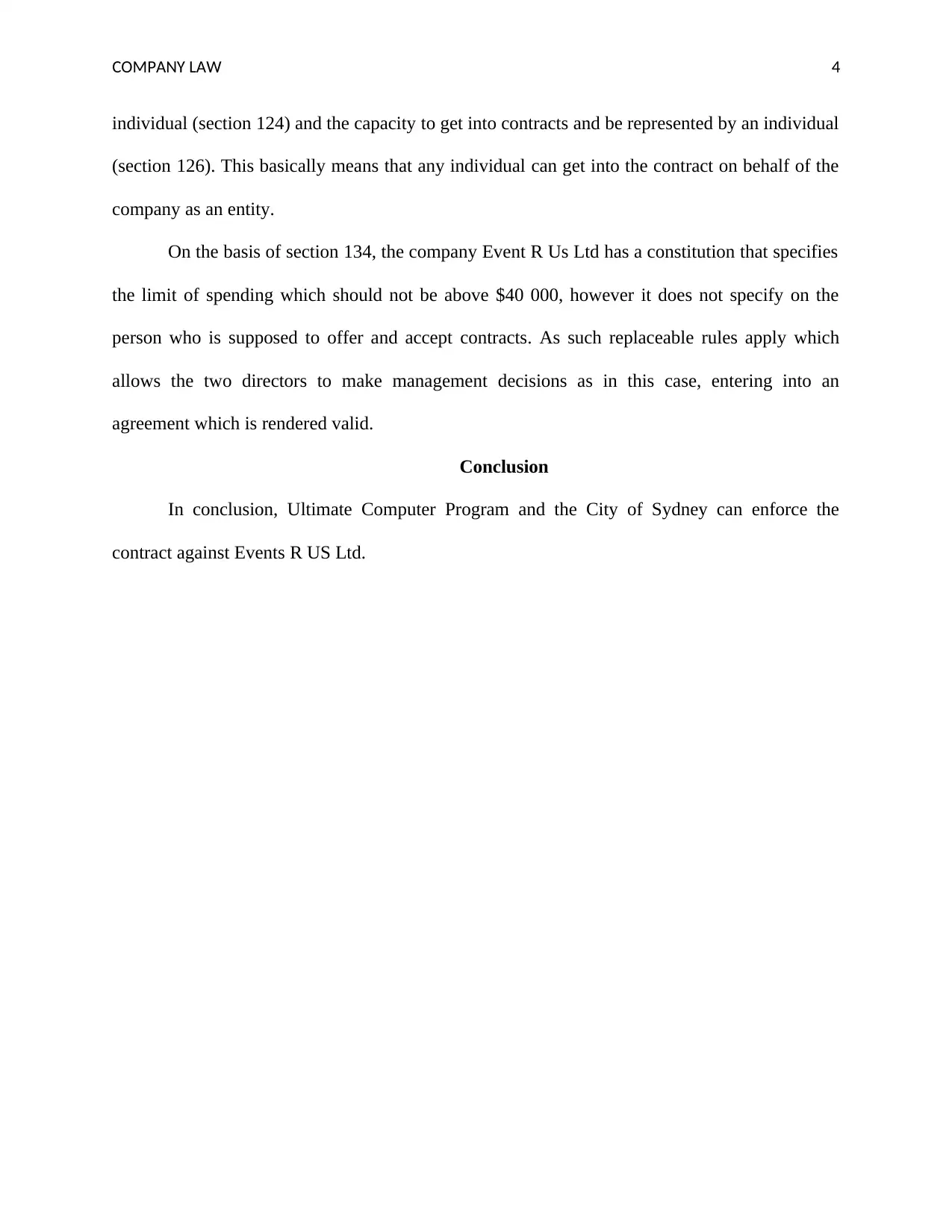
COMPANY LAW 4
individual (section 124) and the capacity to get into contracts and be represented by an individual
(section 126). This basically means that any individual can get into the contract on behalf of the
company as an entity.
On the basis of section 134, the company Event R Us Ltd has a constitution that specifies
the limit of spending which should not be above $40 000, however it does not specify on the
person who is supposed to offer and accept contracts. As such replaceable rules apply which
allows the two directors to make management decisions as in this case, entering into an
agreement which is rendered valid.
Conclusion
In conclusion, Ultimate Computer Program and the City of Sydney can enforce the
contract against Events R US Ltd.
individual (section 124) and the capacity to get into contracts and be represented by an individual
(section 126). This basically means that any individual can get into the contract on behalf of the
company as an entity.
On the basis of section 134, the company Event R Us Ltd has a constitution that specifies
the limit of spending which should not be above $40 000, however it does not specify on the
person who is supposed to offer and accept contracts. As such replaceable rules apply which
allows the two directors to make management decisions as in this case, entering into an
agreement which is rendered valid.
Conclusion
In conclusion, Ultimate Computer Program and the City of Sydney can enforce the
contract against Events R US Ltd.
Paraphrase This Document
Need a fresh take? Get an instant paraphrase of this document with our AI Paraphraser
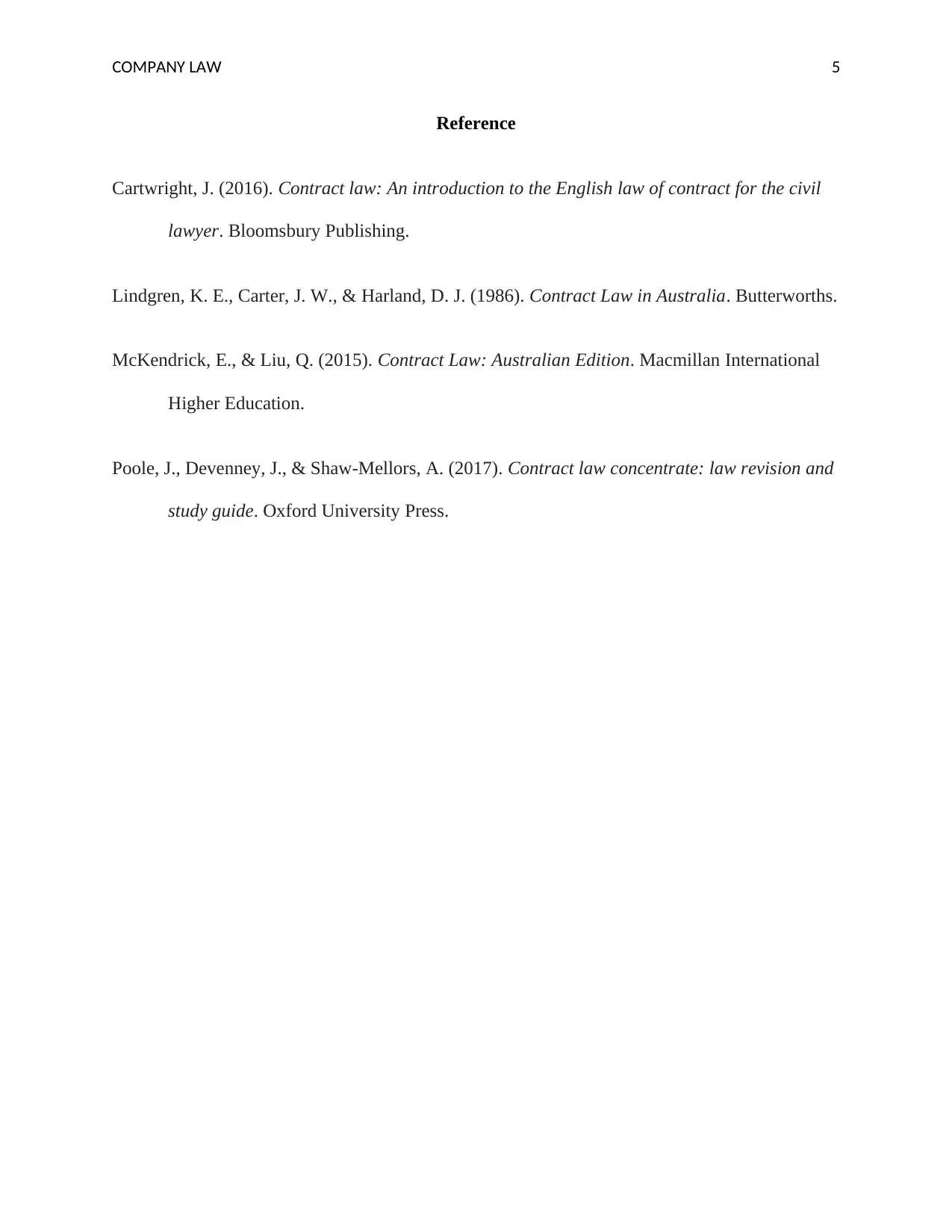
COMPANY LAW 5
Reference
Cartwright, J. (2016). Contract law: An introduction to the English law of contract for the civil
lawyer. Bloomsbury Publishing.
Lindgren, K. E., Carter, J. W., & Harland, D. J. (1986). Contract Law in Australia. Butterworths.
McKendrick, E., & Liu, Q. (2015). Contract Law: Australian Edition. Macmillan International
Higher Education.
Poole, J., Devenney, J., & Shaw-Mellors, A. (2017). Contract law concentrate: law revision and
study guide. Oxford University Press.
Reference
Cartwright, J. (2016). Contract law: An introduction to the English law of contract for the civil
lawyer. Bloomsbury Publishing.
Lindgren, K. E., Carter, J. W., & Harland, D. J. (1986). Contract Law in Australia. Butterworths.
McKendrick, E., & Liu, Q. (2015). Contract Law: Australian Edition. Macmillan International
Higher Education.
Poole, J., Devenney, J., & Shaw-Mellors, A. (2017). Contract law concentrate: law revision and
study guide. Oxford University Press.
1 out of 5
Related Documents
Your All-in-One AI-Powered Toolkit for Academic Success.
+13062052269
info@desklib.com
Available 24*7 on WhatsApp / Email
![[object Object]](/_next/static/media/star-bottom.7253800d.svg)
Unlock your academic potential
Copyright © 2020–2026 A2Z Services. All Rights Reserved. Developed and managed by ZUCOL.





